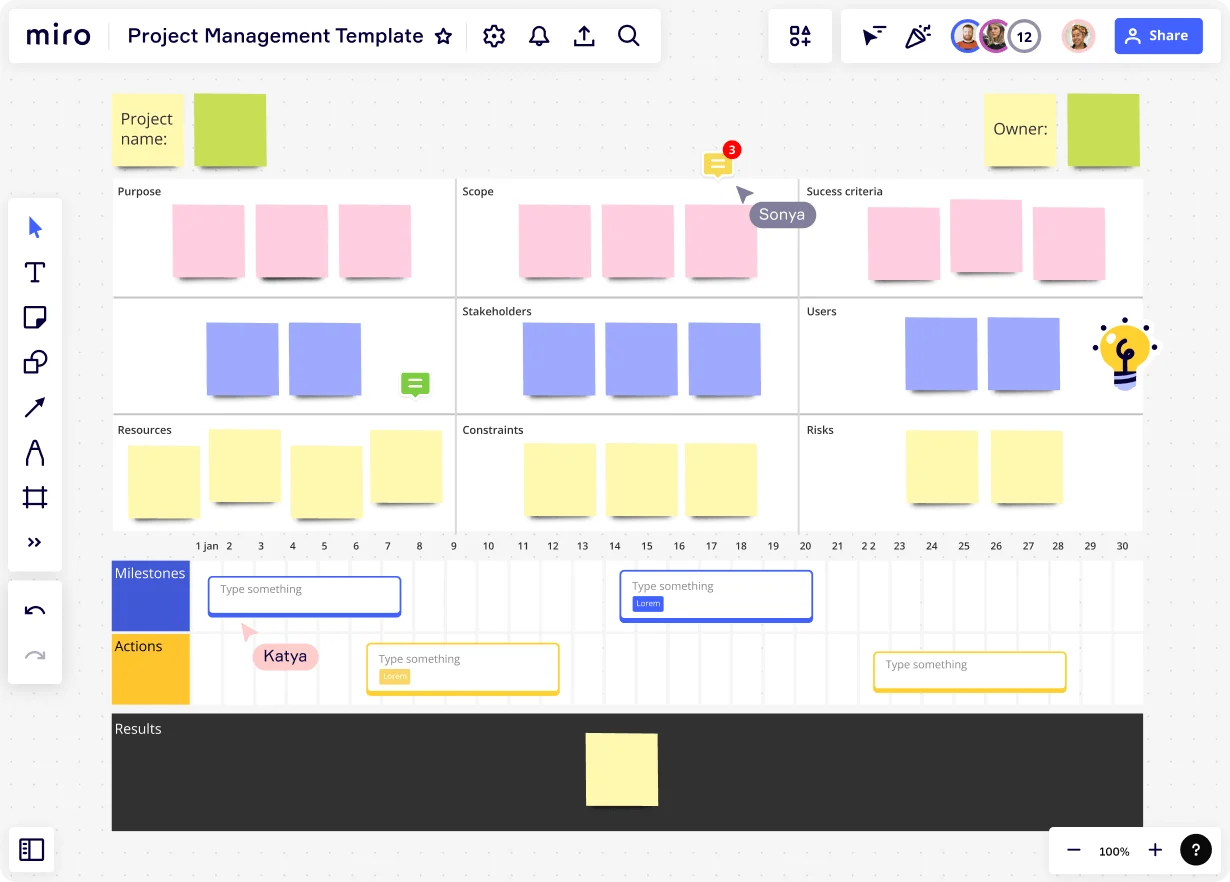
What are project scope requirements?

Summary
In this guide, you will learn:
- What project scope requirements are and their importance
- How to define and document project goals, objectives, and deliverables
- The role of scope boundaries, inclusions, and exclusions
- How to identify constraints, assumptions, and milestones
- Steps to collaborate with stakeholders on scope requirements
- Best practices for managing scope changes and preventing scope creep
Try Miro now
Join thousands of teams using Miro to do their best work yet.
Definition of project scope requirements and its role in project management
Project scope requirements refer to the detailed description of what needs to be accomplished in a project and the specific limits within which it will be executed. In project management, defining scope requirements is a fundamental step that sets the foundation and ensures project planning and execution.
Understanding project scope requirements
By utilizing project management tools to outline project deliverables, objectives, constraints, and inclusions, project scope requirements provide clarity and direction to the project team, stakeholders, and all involved parties.
Project scope requirements. What do they refer to?
Project scope requirements encompass a detailed description of the project's specific goals and objectives, outlining the work that needs to be completed. It also includes defining the key deliverables, milestones, and outcomes that the project aims to achieve. Additionally, the purpose of the project scope requirements is to also identify the constraints and limitations that may impact the project's execution. All these will give a comprehensive understanding of the project's scope, and set the right expectations for the team and stakeholders involved.
Identifying project deliverables, objectives, and constraints
At this stage, project managers work closely with stakeholders to identify the tangible outcomes and deliverables the project will produce. The purpose is to set clear and measurable objectives, ensuring alignment with the organization's strategic goals. Additionally, project constraints, such as budget limitations, timeframes, and available resources, are established to help manage expectations and guide project planning effectively.
Define clear boundaries and inclusions
Defining clear boundaries is essential to determine the project's scope as it prevents any ambiguity regarding what falls within the project's scope and what doesn't. Setting limitations helps prioritize the deliverables as well, and creates realistic expectations for each step of the process.
It's important to determine the limitations early on because in this way, project managers and stakeholders can avoid scope creep, which can lead to project delays and cost overruns. Clear inclusions help ensure that all necessary elements are accounted for, providing a solid foundation for efficient project planning and execution.
Ensuring clarity and focus throughout the project lifecycle
Defining clear project scope requirements provides a roadmap that guides the project team and stakeholders throughout the project's entire lifecycle. With a well-defined scope, everyone involved gains a crystal-clear understanding of the project's objectives, deliverables, and constraints. This clarity eliminates confusion, enhances decision-making, and ensures that all efforts remain aligned with the project's goals, promoting a focused and efficient project execution.
Facilitating effective communication and stakeholder engagement
Starting a project by defining requirements enables project managers to have open and transparent interaction and communication with stakeholders.. By articulating the project's scope, objectives, and boundaries, project managers can effectively engage stakeholders, gain their support, and manage their expectations. Clear and concise communication around project scope cultivates a collaborative environment, where stakeholders actively participate in the project's success, contributing valuable insights and feedback.
Mitigating risks and avoiding scope creep
A well-defined project scope acts as a safeguard against potential risks and scope creep. By outlining project limitations and deliverables, project managers can identify potential risks early on and develop appropriate risk mitigation strategies. Moreover, clearly defined project scope requirements set realistic expectations, ensuring that the project stays on track, adheres to the agreed-upon objectives, and avoids unnecessary changes that could impact project timelines and budgets.
Distinguishing between project scope and product scope
Project scope refers to the specific work and activities required to deliver a unique product, service, or result within a defined timeframe and budget. It encompasses the project's objectives, deliverables, constraints, and resources required for successful project completion. On the other hand, product scope focuses solely on the features, functionalities, and characteristics of the final deliverable itself, excluding the project management activities involved in its creation.
Clarifying their respective roles and impact on project management
The project scope is essential for project management as it defines the project's boundaries, goals, and requirements, guiding the project team's activities and decision-making. It helps project managers establish project plans, allocate resources, and manage stakeholders' expectations. In contrast, the product scope is crucial for understanding what the final deliverable will include and ensuring that it meets the end-users' needs and expectations.
How defining both scopes contributes to successful project execution
Defining both project scope and product scope is vital for successful project execution. A clear project scope sets the foundation for efficient project planning, resource management, and risk mitigation. It aids in preventing scope creep and ensures the project stays on track. On the other hand, a well-defined product scope ensures that the final deliverable aligns with customer requirements, enhances product quality, and increases customer satisfaction. By having both scopes clearly defined and aligned, project managers can deliver high-quality results that meet stakeholders' expectations and contribute to the project's overall success.
Author: Miro Team
Last update: October 16, 2025